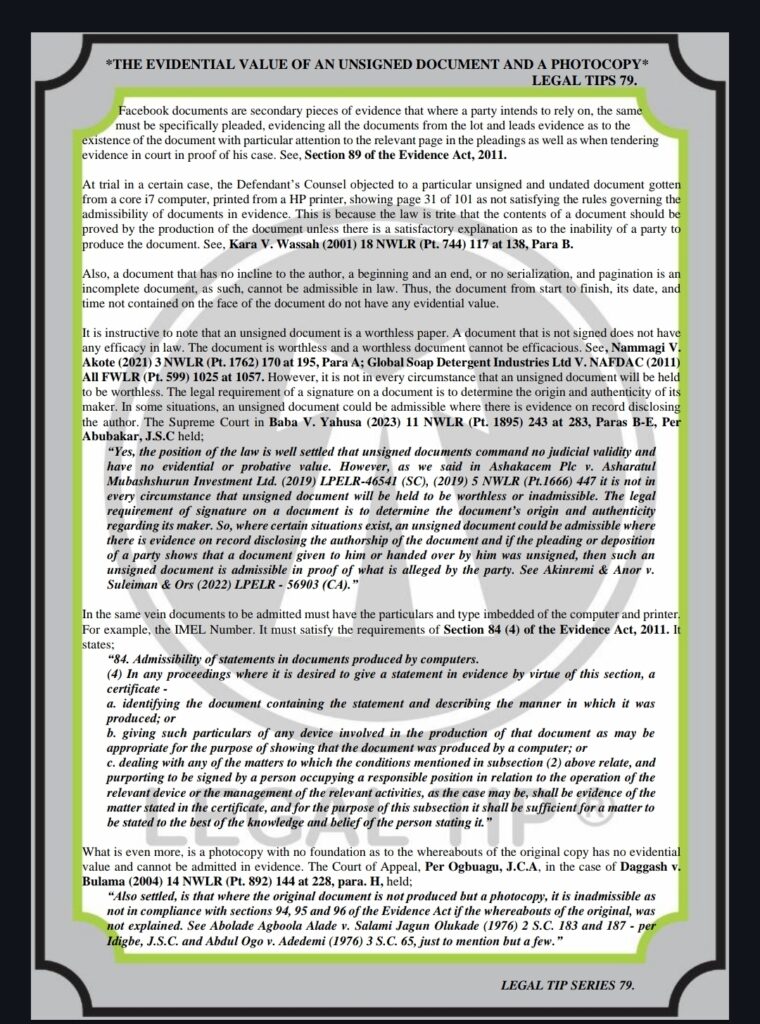Facebook documents are secondary pieces of evidence that where a party intends to rely on, the same must be specifically pleaded, evidencing all the documents from the lot and leads evidence as to the existence of the document with particular attention to the relevant page in the pleadings as well as when tendering evidence in court in proof of his case. See, Section 89 of the Evidence Act, 2011.
At trial in a certain case, the Defendant’s Counsel objected to a particular unsigned and undated document gotten from a core i7 computer, printed from a HP printer, showing page 31 of 101 as not satisfying the rules governing the admissibility of documents in evidence. This is because the law is trite that the contents of a document should be proved by the production of the document unless there is a satisfactory explanation as to the inability of a party to produce the document. See, Kara V. Wassah (2001) 18 NWLR (Pt. 744) 117 at 138, Para B.
Also, a document that has no incline to the author, a beginning and an end, or no serialization, and pagination is an incomplete document, as such, cannot be admissible in law. Thus, the document from start to finish, its date, and time not contained on the face of the document do not have any evidential value.
It is instructive to note that an unsigned document is a worthless paper. A document that is not signed does not have any efficacy in law. The document is worthless and a worthless document cannot be efficacious. See, Nammagi V. Akote (2021) 3 NWLR (Pt. 1762) 170 at 195, Para A; Global Soap Detergent Industries Ltd V. NAFDAC (2011) All FWLR (Pt. 599) 1025 at 1057. However, it is not in every circumstance that an unsigned document will be held to be worthless. The legal requirement of a signature on a document is to determine the origin and authenticity of its maker. In some situations, an unsigned document could be admissible where there is evidence on record disclosing the author. The Supreme Court in Baba V. Yahusa (2023) 11 NWLR (Pt. 1895) 243 at 283, Paras B-E, Per Abubakar, J.S.C held;
“Yes, the position of the law is well settled that unsigned documents command no judicial validity and have no evidential or probative value. However, as we said in Ashakacem Plc v. Asharatul Mubashshurun Investment Ltd. (2019) LPELR-46541 (SC), (2019) 5 NWLR (Pt.1666) 447 it is not in every circumstance that unsigned document will be held to be worthless or inadmissible. The legal requirement of signature on a document is to determine the document’s origin and authenticity regarding its maker. So, where certain situations exist, an unsigned document could be admissible where there is evidence on record disclosing the authorship of the document and if the pleading or deposition of a party shows that a document given to him or handed over by him was unsigned, then such an unsigned document is admissible in proof of what is alleged by the party. See Akinremi & Anor v. Suleiman & Ors (2022) LPELR – 56903 (CA).”
In the same vein documents to be admitted must have the particulars and type imbedded of the computer and printer. For example, the IMEL Number. It must satisfy the requirements of Section 84 (4) of the Evidence Act, 2011. It states;
“84. Admissibility of statements in documents produced by computers.
(4) In any proceedings where it is desired to give a statement in evidence by virtue of this section, a certificate –
a. identifying the document containing the statement and describing the manner in which it was produced; or
b. giving such particulars of any device involved in the production of that document as may be appropriate for the purpose of showing that the document was produced by a computer; or
c. dealing with any of the matters to which the conditions mentioned in subsection (2) above relate, and purporting to be signed by a person occupying a responsible position in relation to the operation of the relevant device or the management of the relevant activities, as the case may be, shall be evidence of the matter stated in the certificate, and for the purpose of this subsection it shall be sufficient for a matter to be stated to the best of the knowledge and belief of the person stating it.”
What is even more, is a photocopy with no foundation as to the whereabouts of the original copy has no evidential value and cannot be admitted in evidence. The Court of Appeal, Per Ogbuagu, J.C.A, in the case of Daggash v. Bulama (2004) 14 NWLR (Pt. 892) 144 at 228, para. H, held;
“Also settled, is that where the original document is not produced but a photocopy, it is inadmissible as not in compliance with sections 94, 95 and 96 of the Evidence Act if the whereabouts of the original, was not explained. See Abolade Agboola Alade v. Salami Jagun Olukade (1976) 2 S.C. 183 and 187 – per Idigbe, J.S.C. and Abdul Ogo v. Adedemi (1976) 3 S.C. 65, just to mention but a few.”

LEGAL TIPS is anchored by Ms CIA Ofoegbunam, an Abuja-based lawyer who is passionate about legal practice. LEGAL TIPS offers quick hints on substantive law, as well as rules of practice and procedure, and serves as a handy reference guide to lawyers, especially in court. Published on a weekly basis, the LEGAL TIPS Series is CIA’s modest contribution to legal development in Nigeria.



